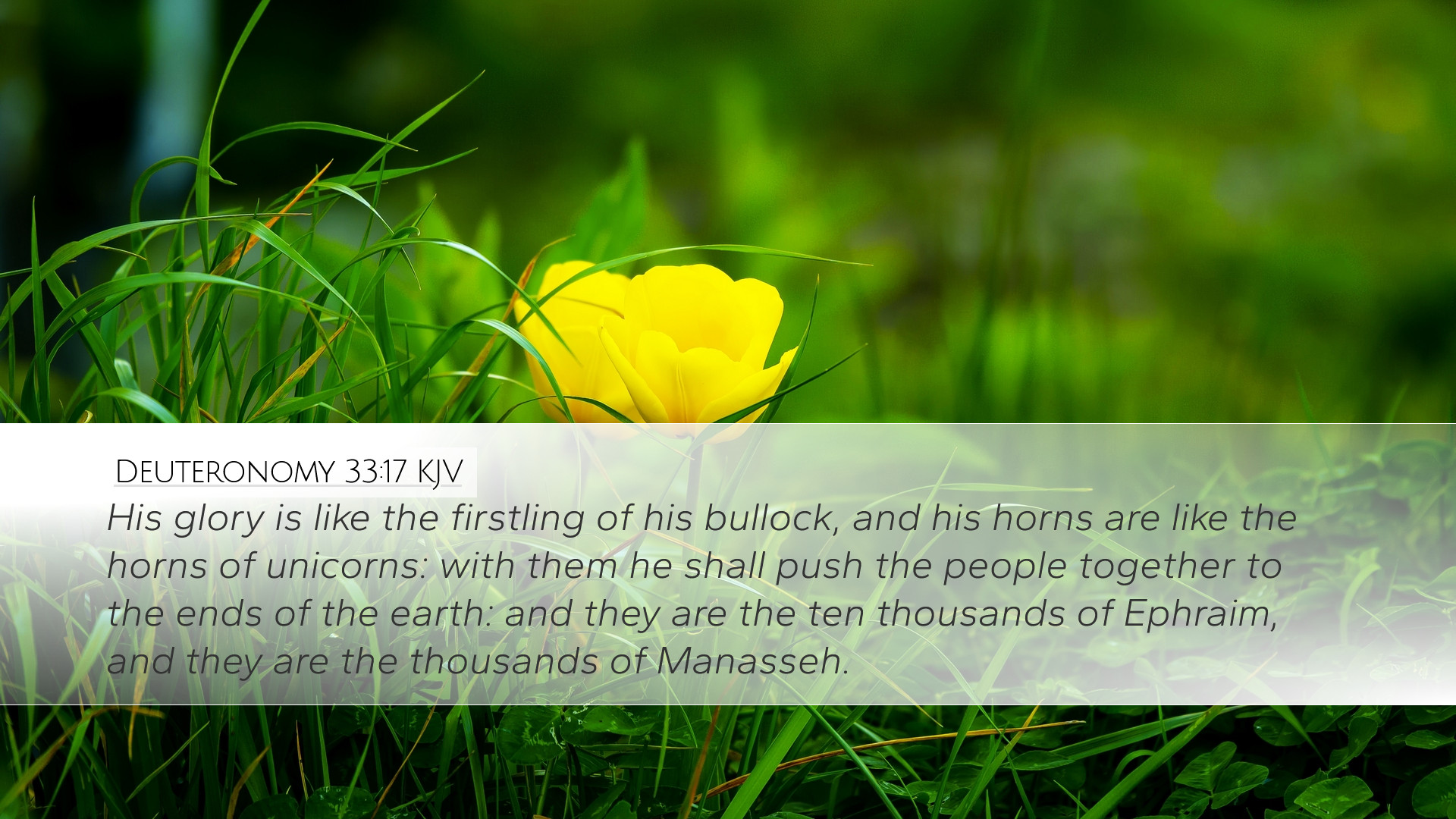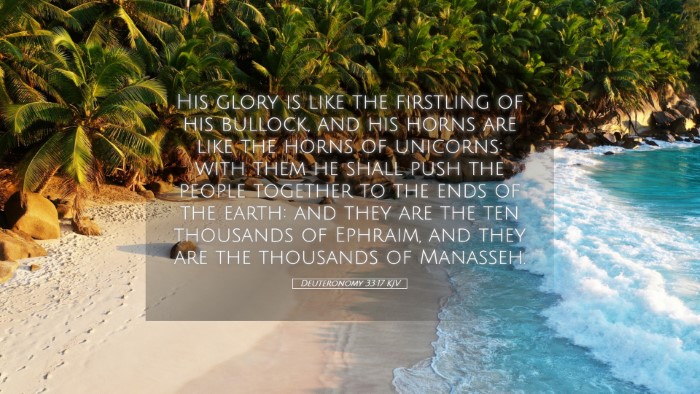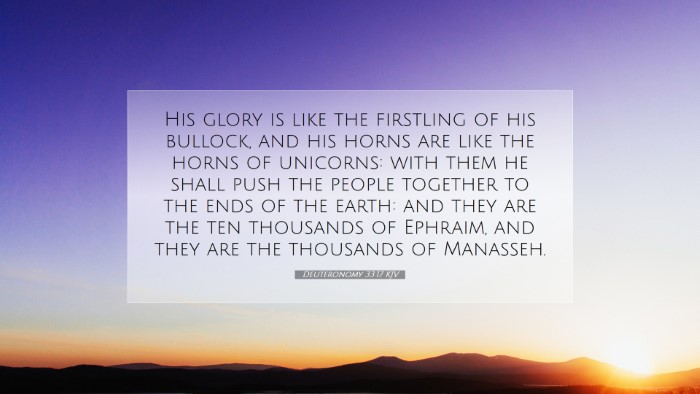Commentary on Deuteronomy 33:17
Verse: “His glory is like the firstling of his bullock, and his horns are like the horns of unicorns: with them he shall push the people together to the ends of the earth: and they are the ten thousands of Ephraim, and they are the thousands of Manasseh.” (KJV)
Introduction
The blessing pronounced upon Joseph in this verse is richly illustrative of the profound themes of strength, glory, and the divine mandate given to his descendants. Joseph, selected to bear the challenges of his family and become a leader in Egypt, symbolizes resilience and God’s providence. This commentary combines insights from renowned public domain commentaries to provide a comprehensive understanding of this significant passage.
Historical Context
The final blessings of Moses, as recorded in Deuteronomy 33, take place as he prepares the Israelites to enter the Promised Land. Moses, understanding the gravity of his impending death and the handling of Israel’s future, articulates blessings on each tribe. Joseph, who is often regarded as a type of Christ, receives particular mention not only due to his status among the tribes but also for the significant role his sons, Ephraim and Manasseh, play in the history of Israel.
Exposition of the Verse
This verse encapsulates the uniqueness and prominence of Joseph among his brethren:
- “His glory is like the firstling of his bullock” - Matthew Henry emphasizes that the “firstling” represents primacy and excellence; Joseph’s prominence is likened to the best of livestock, symbolizing strength, value, and blessing. This indicates Joseph's elevated status and the richness of his inheritance.
- “His horns are like the horns of unicorns” - The imagery of horns conveys power and authority. Adam Clarke suggests that the use of the term "unicorns" reflects a creature of incredible strength. Joseph’s descendants are endowed with the vigorous spirit and power to overcome their foes, reflective of God’s support and protection.
- “With them he shall push the people together to the ends of the earth” - Albert Barnes notes this as a prophetic indication of the dominion and expansion of Joseph’s lineage. The strong leadership and strategic prowess attributed to Joseph’s heirs characterize their role among nations, echoing the idea that their influence would be felt globally.
- “They are the ten thousands of Ephraim, and they are the thousands of Manasseh” - The division of Joseph into two tribes through his sons signifies the dual blessing and substantial growth in numbers and influence for Joseph's lineage. This split suggests a strategic divine plan that enhances their ability to contribute to the Israelite identity.
Theological Implications
The blessings on Joseph highlight several theological truths relevant to the readers today:
- Divine Favor and Blessing: Joseph’s life exemplifies how God favors those who remain faithful through trials. His journey from slavery to the second most powerful man in Egypt is a testimony to God’s providence (Genesis 50:20).
- Leadership and Influence: The notion of pushing “the people together” denotes a unity and strength in leadership reflective of Christ’s call for unity within the Church (John 17:21). The blessing encourages leaders to foster unity in their communities and beyond.
- Legacy and Responsibility: The responsibility of Joseph's descendants to carry forward their legacy involves wielding power righteously. Pastoral leadership today can draw from Joseph’s story, recognizing that strength must be tempered with justice and mercy.
The Role of Joseph in the Broader Narrative
Joseph serves as a typology of Christ, foreshadowing the future Redeemer who would bring hope and salvation to humanity.
- Imprisonment and Suffering: Joseph’s unjust imprisonment parallels Christ’s suffering, yet he remained faithful to God’s plan. This endurance is an essential characteristic that leaders are called to embody.
- Forgiveness: Joseph’s forgiving nature towards his brothers resonates with Jesus’ call to love and forgive enemies (Matthew 5:44). This is a vital lesson for congregational harmony.
Practical Applications for Today
Applying the insights from Deuteronomy 33:17 involves a few key actions:
- Embracing our Heritage: Understanding the gravity of one’s spiritual heritage—much like Joseph embraces his roles—encourages believers to carry forward their faith in knowledge and action.
- Strengthening Community: Churches and ministries can draw from the idea of “pushing together” to promote collaborative efforts within the larger body of Christ, fostering an environment where diverse gifts are utilized for collective mission.
- Pursuing Righteous Leadership: Pastors and leaders should be mindful of how they wield influence, ensuring it reflects the characteristics of Christ—servant leadership that uplifts and empowers others.
Conclusion
Deuteronomy 33:17 stands as a powerful testament to God’s blessings and providence. Joseph’s blessed status serves not only as a historical account but also as an ongoing encouragement for believers to strive towards strength and unity in their journeys. By reflecting on this rich passage, we are called to meditate on the nature of our leadership, the importance of our legacies, and the influence we have in pushing forward God’s mission on earth.


